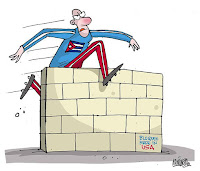The US blockade against Cuba caused on Sunday the rejection of the majority of the international community, as demonstrated by multiple demands made in the high-level debate of the UN General Assembly.
Since the beginning of the general debate at the UN last September 22, leaders of different world nations demanded in their virtual interventions before the plenary of the Assembly the end of that blockade imposed by Washington to Cuba.
At the end of Saturday's session, the Syrian PM and foreign minister, Walid Muallem, condemned the US policy of economic and financial blockade against Cuba and Venezuela, as well as the meddling in the internal affairs of those States, Prensa Latina reported.
At the same time, the Belarusian minister of foreign affairs, Vladimir Makei, asked to stop "commercial wars, arbitrary financial and economic sanctions as a means of political pressure".
High-ranking representatives from Costa Rica, Venezuela, Suriname, St. Vincent and the Grenadines, St. Lucia, the Bahamas, St. Kitts and Nevis, and Trinidad and Tobago demanded an end to the U.S. blockade against the Caribbean island.
African countries such as Kenya, Namibia, Burkina Faso, Equatorial Guinea, Sao Tome and Principe, Guinea Bissau, Chad, and Lesotho; small nations of Oceania such as Tuvalu, Nauru, and Solomon Islands; and Asian states such as Timor Leste, Vietnam, and Laos also voiced their opposition to this action.
Since 1992, the UN General Assembly has passed a resolution each year condemning the US blockade against Cuba and calling for its end.
Despite the call from the international community, the current US administration of Donald Trump has tightened the blockade and adopted new measures to damage the island's economy, in addition to attacking the cooperation of Cuban health professionals.
Cuban News Agency


